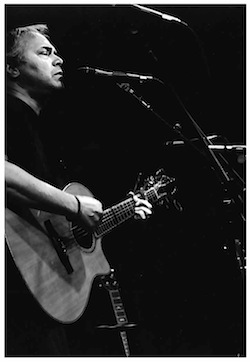
 MusicRow is excited to share three essays from renowned songwriter Marcus Hummon, which are part of his larger collection, Letters to a Young Songwriter. Hummon’s best known hits include Sara Evans’ “Born to Fly,” Tim McGraw’s “One of These Days,” and Dixie Chicks’ “Ready to Run” and “Cowboy Take Me Away.” Hummon and co-writers Bobby Boyd and Jeff Hanna won a 2005 Grammy for Best Country Song for Rascal Flatts’ “Bless The Broken Road.”
MusicRow is excited to share three essays from renowned songwriter Marcus Hummon, which are part of his larger collection, Letters to a Young Songwriter. Hummon’s best known hits include Sara Evans’ “Born to Fly,” Tim McGraw’s “One of These Days,” and Dixie Chicks’ “Ready to Run” and “Cowboy Take Me Away.” Hummon and co-writers Bobby Boyd and Jeff Hanna won a 2005 Grammy for Best Country Song for Rascal Flatts’ “Bless The Broken Road.”
by Marcus Hummon
Seven or eight years ago, I was asked to perform for an annual dinner celebrating Tennessee’s National Guard. There was a stage set in the midst of a huge convention ballroom. I was to perform with another songwriter-artist, a young man who had previously been a Navy Seal. There were over 700 men and women in dress blue uniforms eating and toasting beneath the chandeliers, and after dinner, during dessert and coffee we began the night’s entertainment. It was not lost on me that some of these soldiers would soon police the vicious streets of Iraq…some would not be returning home.
At these affairs you are expected to play “hits,” if you are fortunate enough to have them. So when it came my turn, I started with a song co-written with Darrell Scott and Sara Evans, and sung by Sara on her album of the same title. The song, “Born To Fly,” was used to introduce Vice President Dick Cheney in both the 2000 and 2004 Republican Conventions. The song went off well, but when it came around to me the next time, I decided to play one of my two Dixie Chick singles, “Cowboy Take Me Away.” As I rolled into the opening acoustic guitar arpeggio-riff, the majority of the crowd began to boo lustily! There was a smaller contingent cheering in response, but primarily the ballroom was filled with angry voices displaying displeasure at my choice of songs. I was in something like a state of shock, and uncertain whether or not to continue. I mean, I was actually being booed en masse…at a gig, by a crowd of American soldiers, no less! Just then, the songwriting Navy Seal to my left leaned into the microphone and said, defending me in this very tense moment, “It’s just a song!”
Now here’s the sick part.
Apart from the passions surrounding this moment, as I began to play my song, in open defiance of the booing, I was thinking, “what the hell does he mean, it’s only a song?!” Looking back on the moment, it doesn’t really bother me that the men and women in uniform chose to boo the song that Martie Maguire and I wrote, clearly demonstrating their dislike of the Dixie Chicks, and more specifically, the Chicks’ politics. I didn’t share this perspective back then or now, but I think it’s very exciting when people rise up and express their opinions in a free society. After all, before Natalie Maines was speaking about the President in England, I was out at a rally in Nashville’s Legislative Plaza, expressing my disagreement with our plans to invade Iraq. As American citizens we have a right to speak out in our country, even if one’s position is unpopular. Like most Americans, I’m all for freedom of speech.
But what the hell did he mean “it’s only a song”? Is a song really that meaningless? What’s so disposable about a song…isn’t it living poetry?!
I want to touch the earth/ I want to break it in my hands/ I want to grow something wild and unruly
As usual, I found my ego taking a leading role in the drama at hand. The beauty of the song is its lack of attachment to any particular position, movement, party affiliation, etc.
We are not necessarily concerned with our “time” when we are songwriting; more often than not, we are concerned with things that are timeless. Even a carefree ditty can capture something deep within the human experience; and it is this, our experience of being fully alive, fully present, that we seek.
The journey of the songwriter is about offering some small piece, a short movement in the symphony of our musical and lyrical times, and then, stepping away from it. Our anonymity keeps us honest.



